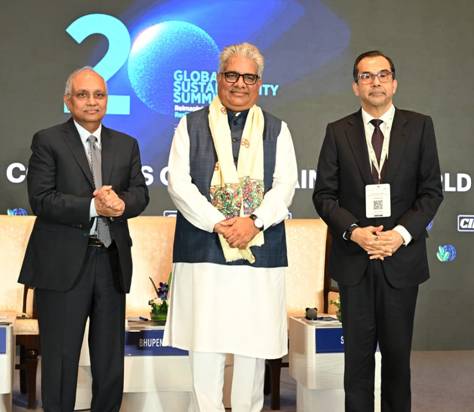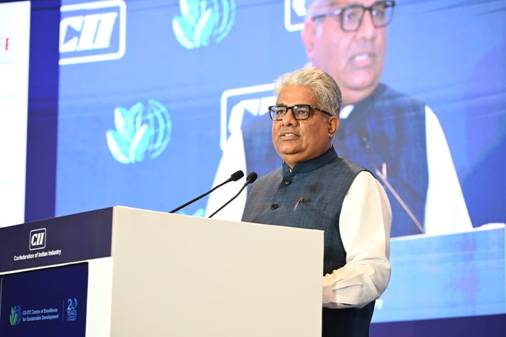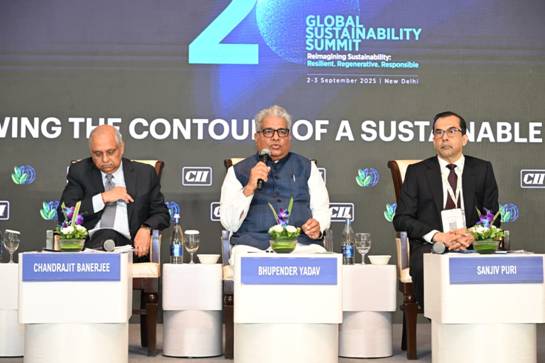Union Minister Shri Bhupender Yadav addresses the 20th Global Sustainability Summit in New Delhi
Union Minister Shri Bhupender Yadav addresses the 20th Global Sustainability Summit in New Delhi
At the 20th Global Sustainability Summit, organized by the CII-ITC Centre of Excellence for Sustainable Development, Union Minister for Environment, Forest and Climate Change, Shri Bhupender Yadav, described India’s journey towards resilient, regenerative and responsible growth. Dignitaries on dais included Shri Chandrajit Banerjee, DG, Confederation of Indian Industry (CII) and Shri Sanjiv Puri, Immediate Past President, CII. The gathering included representatives from over 10 countries and stalwarts from the industry.

Addressing global delegates in New Delhi today, Shri Yadav underlined that India’s model of development is deeply rooted in balancing economic progress with ecological stewardship. “Sustainability should not be considered as a goal or an objective. I believe it is a lifestyle choice, an evolving commitment to be resilient, regenerative, and responsible,” he said. The Minister highlighted that the prevailing global trade tensions, policy uncertainties, geopolitical conflicts, and barriers to global financial investments by major economies, collectively create a fragile environment. The Minister called upon all countries to make sustainability foundational to growth by embracing economy-wide solutions that encompass circular economy models, nature positive actions, green manufacturing and advancing behaviour change for responsible practices.
Shri Yadav highlighted that under the leadership of Prime Minister, Shri Narendra Modi, the Ministry has recently issued very critical notifications with the aim of building a sustainable future. He informed that on 29th August 2025, the Government of India notified the Environment Audit Rules, 2025, which create a formal framework for environmental auditing across the country. These rules establish a two-tiered system of auditors and set up a dedicated agency to transparently oversee the process. “These rules are designed to supplement the existing monitoring and inspection framework of the government, not to replace it”, Shri Yadav stated.
The Minister further informed the gathering about the notification of a revised methodology for the Green Credit Programme on 29th August 2025. Originally launched in October 2023 to encourage voluntary environmental action, the programme has now been strengthened with provisions that allow direct participation by private entities, establish minimum restoration commitments, mobilize private capital for climate action, and utilizate Earned Green Credits. The revised methodology ensures that the Green Credit Programme becomes a catalyst for meaningful eco-restoration, the Minister explained.
In addition, Shri Yadav highlighted that on 31st August 2025, the Ministry amended the Forest (Conservation and Augmentation) Rules, 2023 to facilitate the objectives of achieving self-reliance in the Critical Mineral sector under the newly launched National Critical Mineral Mission, 2025. Under this mission, 24 minerals have been identified as critical and strategic, and 29 others have been recognized as important for strengthening the country’s economy and national security. The amended rules simplify the approval process for mining these minerals in forest areas for both public and private entities.

Reflecting on India’s broader sustainability achievements, Shri Yadav observed that the country has emerged as the fastest-growing major economy while also leading global efforts on climate action. “India is the only country that has successfully adapted sustainable growth across the policy landscape through targeted scheme implementation, infrastructure investment, local commitment and tangible achievements on multilateral commitments,” he noted.
A clear testament of India’s sustainable development commitment, Shri Yadav stated, is the significant progress it has made towards fulfilling NDCs under the Paris Agreement. Recent achievements include achieving ambitious climate targets ahead of schedule; accelerated deployment of renewable energy capacity; promotion of corporate accountability through environmental, social, and governance indicators and advancement of innovative waste management practices leading to circular economy. India is one of leading countries to establish a robust framework of Expended Producer Responsibility (EPR), ensuring disposal of end-of-life products in environmentally sustainable manner, he added.
Pointing to India’s progress in expanding forest cover, launching innovative campaigns like ‘Mission LiFE’, ‘Ek Ped Maa Ke Naam’, enhancing carbon sinks, and advancing circular economy practices, Shri Yadav added, “Our enduring economic progress is founded on resilience, regeneration and responsibility—values that the world must now embrace as the foundation of sustainable growth”. The Minister informed that one of the most significant interventions under the resilience pillar is the upcoming launch of India’s National Adaptation Plan (NAP). “Driven by science-led evidences and guided by grassroot realities, NAP will act as a blueprint for embedding adaptation into national development policies across sectors, ensuring a systematic and long-term approach. It will contribute to build resilience and reduce vulnerabilities to climate- related risks across regions”, he said.
Bringing the focus on a collective global strategy to tackle Climate Change, Shri Yadav stated, “India’s policy roadmap and growth model exemplifies how Nations can harmonize economic growth with sustainability to cultivate resilient, low-carbon development pathways. This integrated approach provides valuable lessons for countries in the Global South seeking sustainable, inclusive and realistic growth models. Developed economies experiencing growth stagnation can undergo transformative recalibration of their development paradigms and shift focus to sustainability, social equity and enduring resilience”, he said.
The Minister concluded with a call to industry and global stakeholders to join hands in this transformative journey. “Industry must transcend conventional goals and weave sustainability seamlessly into their corporate policy by aligning with national aspirations for resilience and inclusion. By embracing resilience, regeneration, and responsibility, let us chart a course towards a more sustainable world,” he said. Shri Yadav expressed confidence that in the next two days, the Summit would deliberate on pioneering transformative pathways that ensure a thriving, inclusive future.
